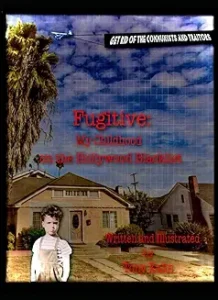Fugitive: My Childhood on the Hollywood Blacklist by Tony Kahn 2024
Tony Kahn uses all the unique assets of the graphic book form to tell the story of his remarkable father and family and growing up in the shadow of the Red Scare and the Hollywood blacklist. Born in Los Angeles in 1945, Kahn’s childhood was marked by harassment and ultimately by the threat of his father’s imprisonment as the Red Scare swept Hollywood. The House UnAmerican Activities Committe (Nixon was a member) specialized in destroying careers of screenwriters, directors, and actors whose liberal politics made them vulnerable to the charge of being a Communist.
Gordon Kahn, who emigrated to America at the age of 6 from Hungary, was a prominent Hollywood figure who was especially targeted by J. Edgar Hoover, the FBI, and HUAC, probably because he had been on the Board of the Screen Writers’ Guild and had written a controversial book, ‘Hollywood on Trial’ in which he wrote that FDR had called for freedom from fear while HUAC’s work was leading to a fear of freedom. When Kahn’s name turned up on the subpoena list after ten Hollywood personalities had been found in contempt and imprisoned for refusing to name names, he fled LA to Mexico, and his family soon followed.
The stories of Tony’s growing up in Cuernavaca, his return to the home of his maternal grandfather in Manchester, NH at the age of 10, his admission to Harvard where he first got experience in radio and news, and the ultimate return of his father to writing and honor shortly before he died of heart disease at age 60 are told with a fine combination of real photos, real documents from J. Edgar Hoover’s memos to letters from supporters and detractors, news clippings, and graphic cartoons. The story moves along rapidly maintaining tension and apprehension as it unfolds.
The author is left with sadness that he never really knew or communicated well with his father, but he honors his memory with this fine book. Gordon Kahn was a principled and upstanding man. One letter from a friend described him as follows: “He was principle put into practice. He was a blithe spirit with a precious sense of humor. He was one of the few, true valiant people I have known—a writer’s writer.” While in Mexico, Kahn wrote a novel entitled “A Long Way Home”. Because of the blacklist, the book wouldn’t be published for 25 years after his death. In it the main character, an immigrant from South America, says: “The U.S. of the north makes no mistakes from which it cannot survive. Even at its worst, America like a great work in progress, corrects its errors and goes into another rewrite.” Gordon Kahn must have been channeling a recent column by Heather Cox Richardson who pointed out the times in American history when fascism was in the ascendency and democracy appeared to be dead. Each time, Americans voted to self-correct, as Gordon Kahn foresaw, perhaps anticipating the coming election.
At this time of renewed political peril, Tony Kahn, a much honored radio and podcast producer, has told his father’s story, a real example of how governmental power in the wrong hands and used without restraint can ruin lives. Gordon Kahn’s story demonstrates how America can self-correct. His son may regret not knowing his father better, but he honors him and us with this book.



